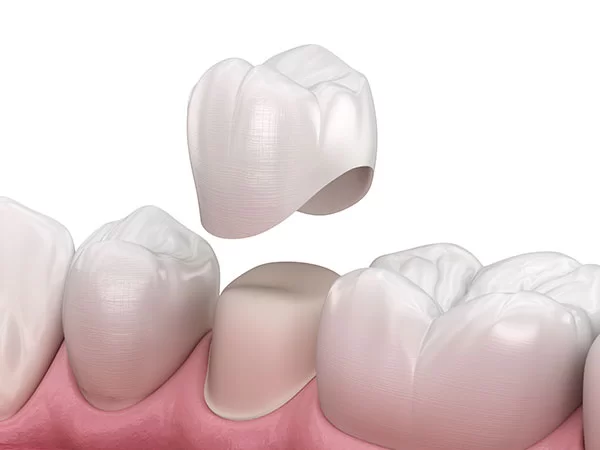Know When to Visit the Dentist for a Dental Crown
Dental crowns are essential for restoring damaged teeth, enhancing aesthetics, and maintaining lasting oral health. If you’re dealing with dental issues or have concerns about your teeth’s condition, knowing when a dental crown might be necessary can save you discomfort and help prevent further issues.
Drs. Patrick Ruehle and Erika Eide, your dedicated dentists in Denton, TX, offer expertise in restoring teeth with dental crowns. Call our Denton dental practice at (940) 566-4888 to learn more or book a consultation.
Do You Need a Dental Crown?
Severe Tooth Decay or Cavities
When tooth decay or cavities progress to an advanced stage, a dental crown may be necessary to restore the tooth’s structure and prevent further damage.
- Persistent Pain or Sensitivity: Ongoing toothaches or temperature sensitivity may signal that decay has reached the tooth’s nerve. A crown can shield the tooth, providing relief and protecting against further damage.
- Visible Decay: Dark spots, holes, or pits are clear indicators of advanced decay. A dental crown can restore the tooth and prevent additional deterioration.
Cracked or Fractured Teeth
Accidents or trauma can lead to cracked or fractured teeth, compromising their strength and function.
- Pain with Chewing: Discomfort when chewing could mean a cracked or fractured tooth, which may worsen without treatment. A crown stabilizes and reinforces the tooth.
- Temperature Sensitivity or Rough Edges: Sharp pain when exposed to hot or cold can indicate a crack, while rough edges can irritate your tongue or cheeks. A dental crown smooths out rough surfaces, protecting the tooth and reducing sensitivity.
Large Fillings
If you have a tooth with a large filling, it may weaken over time, leading to discomfort, tooth sensitivity, or even fracture. A dental crown provides better coverage, stability, and insulation.
Root Canal Treatment
After undergoing a root canal treatment, the affected tooth may require a dental crown to protect the tooth’s structure, extending the tooth’s longevity and functionality.
Misshapen or Discolored Teeth
Do you have misshapen or severely discolored teeth that affect your smile? Dental crowns can be an effective cosmetic solution to enhance the appearance of your teeth, providing a natural-looking and uniform smile.
Dental Bridge Attachment
When replacing a missing tooth with a dental bridge, the adjacent teeth that support the bridge may need dental crowns. Crowning these teeth ensures they can provide a stable foundation for the bridge, ensuring a secure and functional replacement.
Cracked Enamel
The outer layer of your teeth, known as enamel, is crucial for protecting the inner structures. If your enamel is cracked or significantly worn down, a dental crown can shield the affected tooth from further damage.
- Visible Cracks or Rough Edges: Damaged enamel can show visible lines or jagged surfaces. A crown smooths and shields the enamel, preventing further cracking and discomfort.
- Tooth Staining: Cracks can lead to discoloration as food particles seep in, which a crown can effectively conceal.
Tooth Grinding (Bruxism)
Persistent tooth grinding, also known as bruxism, can lead to excessive wear and tear on your teeth. Dental crowns can help restore the shape and structure of your teeth, preventing further damage caused by grinding.
- Worn or Flattened Surfaces: Persistent grinding wears down teeth, making crowns a helpful way to restore natural tooth shape.
- Jaw Pain or Headaches: Grinding can strain jaw muscles, often causing headaches. A crown and other treatments can alleviate these symptoms.
Dental Implant Restoration
When replacing a missing tooth with a dental implant, a dental crown is typically used to cover the implant post. This crown acts as a natural-looking replacement tooth that blends seamlessly with your smile.
Aesthetic Concerns
If you are unhappy with the appearance of your teeth due to gaps, misalignment, or other cosmetic issues, dental crowns can help you achieve the smile you desire. They can improve the shape, size, and color of your teeth for a more aesthetically pleasing result.
Choosing the Right Dental Crown
Your choice of crown depends on factors like durability, appearance, and the tooth’s location. Popular types include:
- Porcelain Crowns: Natural-looking appearance and perfect for visible front teeth.
- Zirconia Crowns: A biocompatible material that’s highly durable with a translucent finish.
- Metal Crowns: Made from metals like gold or silver alloy, metal crowns are reliable and strong, ideal for molars.
- Porcelain-fused-to-metal (PFM) Crowns: Combines the strength of metal with aesthetic appeal for porcelain, ideal for front and back teeth.
Factors to Consider
When considering a dental crown, there are several important factors to keep in mind. These factors can help you make an informed decision and ensure the best possible outcome for your dental health.
- Longevity: Dental crowns are designed to be long-lasting, but the actual lifespan can vary depending on factors like oral hygiene, habits, and the material used. Discuss the expected longevity of different crown options with your dentist.
- Cost: The cost of dental crowns can vary based on factors such as the material chosen, the complexity of the procedure, and your location. Discuss the cost and payment options with your Denton dentists.
- Appearance: If you have cosmetic concerns, such as front teeth that are visible when you smile, consider the aesthetic aspect of the crown. Porcelain or all-ceramic crowns are excellent options for a natural and pleasing appearance.
- Tooth Preparation: The extent of tooth preparation required for a dental crown can vary. In some cases, minimal preparation is sufficient, while in others, more significant reshaping may be necessary.
Frequently Asked Questions
Porcelain and zirconia crowns balance aesthetics and durability, but metal options are stronger for less visible teeth. Discuss your options with your dentist for a tailored recommendation.
Without a crown, a vulnerable tooth can deteriorate quickly, risking fractures, decay, or even tooth loss. Addressing the need for a crown promptly helps preserve tooth health.
If a tooth requires a dental crown but you choose not to get one, several complications may arise. The tooth’s structural integrity may be compromised, leading to further damage, such as cracks, fractures, or decay. This can result in pain, sensitivity, and even tooth loss. It’s best to follow your dentist’s advice and get a dental crown when necessary to preserve the tooth’s health and function.
While veneers and bonding may serve as alternatives to dental crowns, they’re often best for minor cosmetic fixes. Crowns are generally the preferred choice for teeth requiring more structural support.
Begin Your Journey to a Restored Smile with Dental Crowns
Recognizing the signs for a dental crown helps you make informed choices for lasting dental health. Contact Dr. Ruehle and Dr. Eide in Denton, TX, serving Robson Ranch, Corinth, Argyle, and Krum, to discuss how dental crowns can enhance your smile and keep your teeth strong for years to come.




